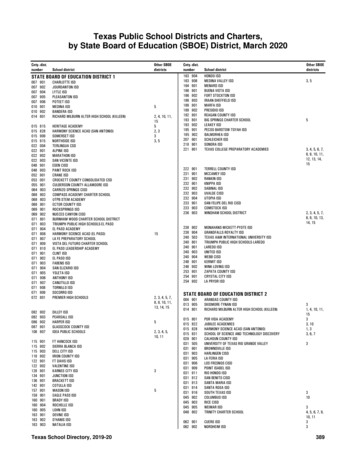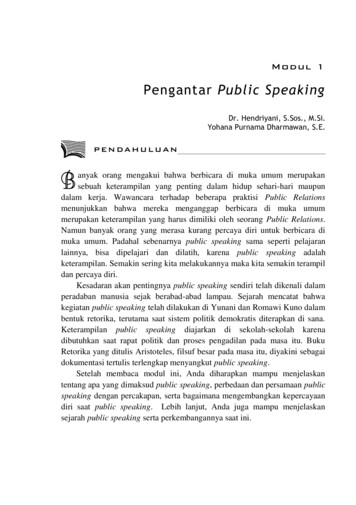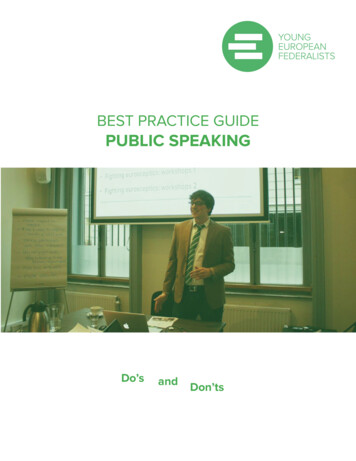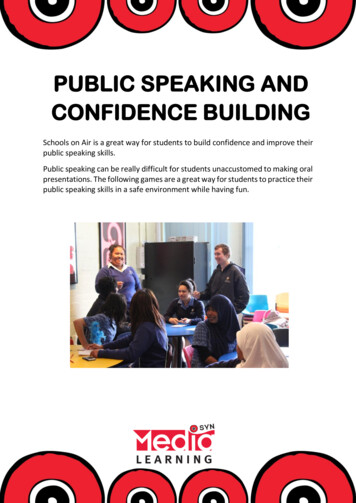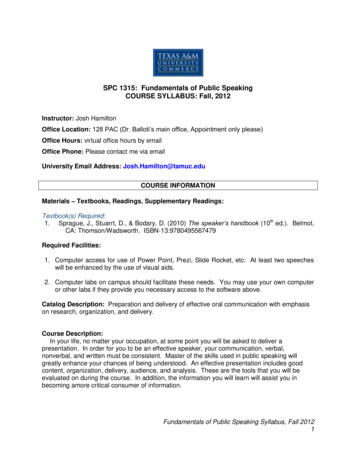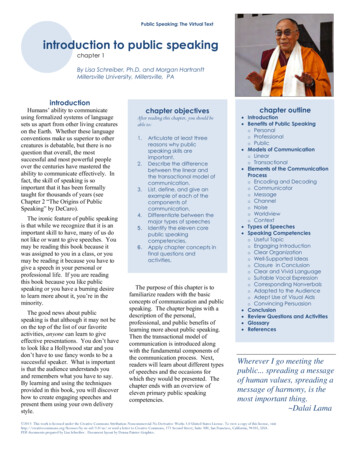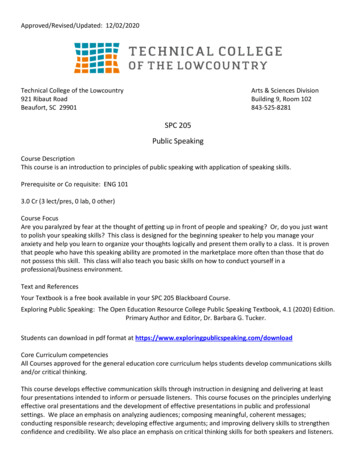
Transcription
Approved/Revised/Updated: 12/02/2020Technical College of the Lowcountry921 Ribaut RoadBeaufort, SC 29901Arts & Sciences DivisionBuilding 9, Room 102843-525-8281SPC 205Public SpeakingCourse DescriptionThis course is an introduction to principles of public speaking with application of speaking skills.Prerequisite or Co requisite: ENG 1013.0 Cr (3 lect/pres, 0 lab, 0 other)Course FocusAre you paralyzed by fear at the thought of getting up in front of people and speaking? Or, do you just wantto polish your speaking skills? This class is designed for the beginning speaker to help you manage youranxiety and help you learn to organize your thoughts logically and present them orally to a class. It is proventhat people who have this speaking ability are promoted in the marketplace more often than those that donot possess this skill. This class will also teach you basic skills on how to conduct yourself in aprofessional/business environment.Text and ReferencesYour Textbook is a free book available in your SPC 205 Blackboard Course.Exploring Public Speaking: The Open Education Resource College Public Speaking Textbook, 4.1 (2020) Edition.Primary Author and Editor, Dr. Barbara G. Tucker.Students can download in pdf format at re Curriculum competenciesAll Courses approved for the general education core curriculum helps students develop communications skillsand/or critical thinking.This course develops effective communication skills through instruction in designing and delivering at leastfour presentations intended to inform or persuade listeners. This course focuses on the principles underlyingeffective oral presentations and the development of effective presentations in public and professionalsettings. We place an emphasis on analyzing audiences; composing meaningful, coherent messages;conducting responsible research; developing effective arguments; and improving delivery skills to strengthenconfidence and credibility. We also place an emphasis on critical thinking skills for both speakers and listeners.
Approved/Revised/Updated: 12/02/2020It is important that you learn to develop your communication skills and that you learn how to present yourfindings to others. This is both a theory and a skills course, and our primary goal is for you to gain competencein public speaking and critical listening. In order to achieve our goal, we will engage in various activities,assignments, speeches, etc.Course GoalsThe following list of course goals will be addressed in the course. These goals are directly related to theperformance objectives.1. Understand the communication process and the ways that culture and diverse experiences impact thesharing of meaning.2. Analyze the audience and situation and adapt your speech to the specific cultural and social context inwhich it will be delivered.3. Conduct research and evaluate the quality of support materials and their appropriateness for use in aparticular context.4. Prepare full sentence preparation outlines that include appropriate organization, well-supportedclaims, reasoned arguments, and sensitivity to the rhetorical situation.5. Perform a series of speeches using effective delivery techniques (e.g. vocal variety/articulation,gestures/body movement, and interacting with the audience), presentation aids (includingPowerPoint), and ethical communication practices appropriate for use in business and educationalsettings.6. Explain complex ideas to non-expert audiences and advocate for significant causes using appropriatedeductive and inductive reasoning.7. Practice effective listening in order to evaluate the public communication of others and provideconstructive feedback through a series of peer evaluations and self-evaluations.Student ContributionsFor this course to run properly, the student is expected to be prepared for each class including, but not limitedto, reading assignments and speaking assignments. Attendance is a great contributor to student success inpublic speaking.Course EvaluationYour final grade for the course will be determined by the average of all speeches, exam scores and completionof all required assignments. See CLASS INFORMATION Section for specific details about scoring proceduresand due dates.TCL's grading scale is:90 - 100 80 - 89 70 - 79 60 - 69 Below 60 ABCDFCourse ScheduleThe class meets for 3 lecture/presentation hours per week. The content will be introduced in the same orderas they are listed in the course goal section. The content goals will be finished in a varied manner.
Approved/Revised/Updated: 12/02/2020STATEMENT OF NON-DISCRIMINATIONThe Technical College of the Lowcountry is committed to a policy of equal opportunity for all qualifiedapplicants for admissions or employment without regard to race, gender, national origin, age, religion, maritalstatus, veteran status, disability, or political affiliation or belief.ADA STATEMENTThe Technical College of the Lowcountry provides access, equal opportunity and reasonable accommodationin its services, programs, activities, education and employment for individuals with disabilities. To requestdisability accommodation, contact the counselor for students with disabilities at (843) 525-8219 or (843) 5258242 during the first ten business days of the academic term.ACADEMIC MISCONDUCTThere is no tolerance at TCL for academic dishonesty and misconduct. The College expects all students toconduct themselves with dignity and to maintain high standards of responsible citizenship.It is the student’s responsibility to address any questions regarding what might constitute academicmisconduct to the course instructor for further clarification.The College adheres to the Student Code for the South Carolina Technical College System. Copies of theStudent Code and Grievance Procedure are provided in the TCL Student Handbook, the Division Office, and theLearning Resources Center.ATTENDANCEThe College’s statement of policy indicates that students must attend ninety percent of total class hours orthey will be in violation of the attendance policy. Students not physically attending class during the first ten calendar days from the start of thesemester must be dropped from the class for NOT ATTENDING. Students taking an online/internet class must sign in and complete an assignment designatedby the instructor within the first ten calendar days from the start of the semester to indicateattendance in the class. Students not attending class during the first ten calendar days fromthe start of the semester must be dropped from the class for NOT ATTENDING. Reinstatement requires the signature of the division dean. In the event it becomes necessary for a student to withdraw from the course OR if a student stopsattending class, it is the student’s responsibility to contact the instructor via e-mail requesting to bewithdrawn from the class. Withdrawing from class may have consequences associated with financial aidand time to completion. Students are strongly encouraged to consult with Financial Aid prior towithdrawing from any class, particularly if the student is currently on a warning or probation status. When a student exceeds the allowed absences, the student is in violation of the attendance policy. Theinstructor MUST withdraw the student with a grade of “W”, “WP”, or “WF” depending on the date thestudent exceeded the allowed absences and the student’s progress up to the last date of attendanceor
Approved/Revised/Updated: 12/02/2020 Under extenuating circumstances and at the discretion of the faculty member teaching the class, allow thestudent to continue in the class and make-up the work. This exception must be documented at the timethe allowed absences are exceeded.Absences are counted from the first day of class. There are no "excused" absences. All absences arecounted, regardless of the reason for the absence.A student must take the final exam or be excused from the final exam in order to earn a non-withdrawalgrade.A copy of TCL’s STATEMENT OF POLICY NUMBER: 3-1-307 CLASS ATTENDANCE (WITHDRAWAL) is on file inthe Division Office and in the Learning Resources Center.ONLINE ATTENDANCE PROCEDUREFor all online courses, students must complete an assignment designated by the instructor during the firstweek of classes. The instructor will drop the student from the course if the initial assignment is not completed.Instructors will withdraw students from the class when 90% attendance is not maintained. Attendance inan online course is defined by regular course access and by timely completion of assignments as required bythe instructor. Each student will be expected to access the web class at least once a week and complete 90%of assignments on time. Additional access is encouraged and may be necessary for successful completion ofclasses.Failure to log in and complete assignments will result in the student being withdrawn from the course. Theinstructor will assign a grade of “W,” “WP,” or “WF” based upon the student’s academic standing as the lastdate of attendance, which is the last login. Students are responsible for any financial matters associated withan administrative withdrawal. If a fails to email the instructor (using the my.tcl.edu email account) requestingto be dropped from the course and has not submitted the initial assignment required during the first week ofclass, the instructor will assign a “Never Attended” code in the student information system (web-advisor) nolater than ten calendar days after the first day of the class. Students who are dropped as a result of neverattending the course are still responsible for all fees associated with the course.HAZARDOUS WEATHERIn case weather conditions are so severe that operation of the College may clearly pose a hardship on studentsand staff traveling to the College, notification of closing will be made through the following radio andtelevision stations: WYKZ 98.7, WGCO 98.3, WGZO 103.1, WFXH 106.1, WWVV 106.9, WLOW 107.9, WGZR104.9, WFXH 1130 AM, WLVH 101.1, WSOK 1230 AM, WAEV 97.3, WTOC TV, WTGS TV, WJWJ TV, and WSAVTV. Students, faculty and staff are highly encouraged to opt in to the Emergency Text Message AlertSystem. www.tcl.edu/textalert.asp.EMERGENCY TEXT MESSAGE ALERTStudents, faculty and staff are highly encouraged to opt in to the Emergency Text Message AlertSystem. Participants receive immediate notification of emergency events and weather cancelations via textmessaging on their cell phones. Participants can also opt in to receive non-emergency news andannouncements. Go to www.tcl.edu. On the homepage, click on “emergency TextAlert at TCL” and fill out theform or go to www.tcl.edu/textalert.asp.
Approved/Revised/Updated: 12/02/2020GRADING METHODOLOGYThe final grade must be 70 or more (a grade “C” or better) in order to pass the course and progress to the nextcourse. Students absent from an examination or presentation will receive a “0” grade for the examinationunless other arrangements are made with the individual instructor prior to the examination or presentationday or on the examination or presentation day before the test/presentation is scheduled to be given.The student is responsible for notifying the instructor for the reason of the absence. It is also theresponsibility of the student to contact the appropriate instructor to arrange to make up theexamination. Arrangements may be completed by telephone.If the instructor is not available, a message should be left on the instructor’s voice mail AND with anothermember of the faculty or administrative assistant. The make-up exam will be scheduled and the instructor willdecide the method of examination. Messages sent by other students are unacceptable.SAFETY ADDENDUMPurposeThe purpose of this safety addendum is to provide each student with safety guidelines during an incident,emergency, or disaster at TCL. In addition, it provides students guidelines for lockdown procedures,evacuation procedures, and active shooter.DefinitionsAn incident is any event, potential or actual, that may impact normal operations but has no immediate healthor life threatening consideration or serious effect on the overall functional capacity of the College. An event ofthis nature should be reported to the Office of the Vice President for Administrative Services. Also notify theoff-site campus administrator if applicable.An emergency is any incident, potential or actual, which may endanger life or health or which affects an entirebuilding or buildings, and will disrupt the overall operations of the College. Outside emergency services willprobably be required, as well as major efforts from campus support services. Major policy considerations anddecisions will usually be required from the college administration during times of crises. An emergency shouldbe reported immediately by directly using 911 if life or health/injury considerations exist and then to theOffice of the President or Vice President for Administrative Services as quickly as possible. Also notify the offsite campus administrator if applicable.A disaster is any event or occurrence that has taken place and has seriously impaired or halted the operationsof the College. In some cases, mass personnel casualties and severe property damage may be sustained. Acoordinated effort of all campus-wide resources is required to effectively control the situation. Outsideemergency services will be essential. In all cases of disaster, an Emergency Control Center will be activated,and the appropriate support and operational plans will be executed. The disaster should be immediatelyreported, first by calling 911 and then to the Office of the President or Vice President for AdministrativeServices. Also notify the off-site campus administrator if applicable.Types of Emergencies Hurricane Tornado Fire
Approved/Revised/Updated: 12/02/2020 Biochemical or Radiation SpillExplosion/BombDowned Aircraft (crash which directly impacts campus operations)Utility FailuresViolent or criminal behaviorPsychological CrisisProcedures:Active ShooterRun/hide/fight lding Evacuation1. Building evacuations occur when an alarm sounds and/or upon notification by Security or the EmergencyDirector.2. When the building evacuation alarm is activated during an emergency, individuals should exit according tothe building evacuation plan and alert others to do the same.3. Once outside, individuals should proceed to a clear area that is at least 500 feet away from the affectedbuilding. Streets, fire lanes, hydrant areas and walkways should be kept clear for emergency vehicles andpersonnel.4. Individuals should not return to an evacuated building unless told to do so by Security or the EmergencyDirector.5. Individuals should assist persons with disabilities in exiting the building. Elevators are reserved for disabledpersonsCampus Evacuation1. A uniformed Security Guard, the Emergency Director, or an Emergency Resource Team member willannounce evacuation of all or part of the campus grounds.2. All persons (students and staff) are to immediately vacate the campus, or in the case of a partialevacuation relocate to another part of the campus grounds as directed.Lockdown1. Clear the halls2. Report to the nearest classroom/office3. Assist those needing special assistance4. Ensure classroom/office doors are closed and locked5. Turn off lights6. Stay away from doors and windows (out of the line of sight)7. BE QUIET and follow instructor’s directions8. Silence cell phones9. Wait for the “All Clear” before leaving
Your Textbook is a free book available in your SPC 205 Blackboard Course. Exploring Public Speaking: The Open Education Resource College Public Speaking Textbook, 4.1 (2020) E
